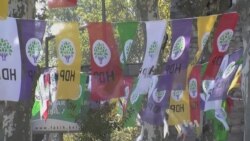In squares and shopping malls across Istanbul, rival parties have set up election stalls to try to lure in undecided voters as Turks prepare to go to the polls November 1 for their second election in six months.
This election became necessary after rival parties failed to agree on forming a coalition government following the last vote in June, and it is taking place against the backdrop of the recent bomb attack on a Kurdish peace rally in Ankara. Fear of the threats facing the country is driving a deepening polarization of society and has produced an increasingly bitter campaign.
President Recep Tayyip Erdogan’s AK party has led Turkey for 13 years. Sociologist Ferhat Kental of Sehir University said the AK party’s early years in power were characterized by reconciliation.
“Since the starting time of the [Turkish] republic, this society witnessed or lived under polarized conditions," he said. "But for the first time, maybe, during the AKP era — for the first, let’s say, 10 years — it was easy to think that maybe we are finishing with that polarization.”
Kentel said such optimism followed Erdogan’s moves to give the Kurdish minority better rights, as well as a partial recognition of past atrocities against Armenians. But the political atmosphere has turned full circle.
“After 2011, more or less, we fell again under this polarization," Kentel said. "They prefer to concentrate on a very specific identity of AKP.”
Critics say that identity is increasingly conservative and authoritarian.
Blame for insurgency
Market vendor Halit Aytekin, 70, who sells hawthorn fruit and walnuts in the Kurdish neighborhood of Zeyrek, said he planned to vote for the pro-Kurdish HDP party.
“Erdogan used to be good,” he said, “but after the last election in June, because he didn’t win the election, he became bad. He is the reason the war with the Kurds has started again.”
The government blames Kurdish PKK separatists for restarting the insurgency. At the same time, Turkey is deeply embroiled in the Syrian civil war, which has forced 2 million refugees to seek shelter on its soil.
Erdogan’s supporters say he has transformed Turkey into a respected power. Among them is Mehmet Salman, who sells souvenirs in the conservative Istanbul district of Fatih.
Salman said that “Kurds, Turks, Alawites, Syrians, [Mohamed] Morsi supporters in Egypt, and all people in Arab countries that are suppressed by their government — they like Erdogan. And he has given a lesson in humanity to Europe and America by hosting the refugees.”
Passions are running high on all sides. The challenge for the next government will be to bridge the widening divides across Turkish society.





